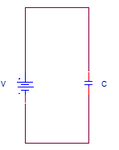electronic_satya
Member level 2
Hi all,
i have attached a circuit diagram which contains a capacitor in parallel to a voltage source, is the configuration possible? i.e. does the capacitor gets charged? capacitor gets charged by the voltage or the current flowing through it? a resistor is required to charge the capacitor?
thanks in advance,
regards,
satya
i have attached a circuit diagram which contains a capacitor in parallel to a voltage source, is the configuration possible? i.e. does the capacitor gets charged? capacitor gets charged by the voltage or the current flowing through it? a resistor is required to charge the capacitor?
thanks in advance,
regards,
satya
